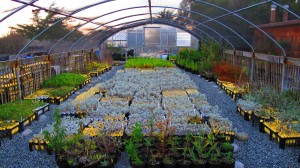16
Jun
France Calls for Ban on Sale of Monsanto Herbicide Roundup in Nurseries
(Beyond Pesticides, June 16, 2015) France’s Ecology Minister Segolene Royal announced Sunday a call to stop the sale of the popular Monsanto herbicide Roundup (glyphosate) from garden centers. The announcement comes just a couple of months after the active ingredient, glyphosate, was classified in March as “probably carcinogenic to humans” by the United Nation’s International Agency for Research on Cancer (IARC).
 “France must be on the offensive with regards to the banning of pesticides,” Royal said on French television. “I have asked garden centers to stop putting Monsanto’s Roundup on sale” in self-service aisles, she added.
“France must be on the offensive with regards to the banning of pesticides,” Royal said on French television. “I have asked garden centers to stop putting Monsanto’s Roundup on sale” in self-service aisles, she added.
The announcement comes after a request by French consumer association CLCV (Consumption, Housing and Environment – Consommation, Logement et Cadre de vie) to French and European officials to stop selling glyphosate-based products to amateur gardeners.
Royal also announced last week that from January 2018 onwards, phytosanitary products —used to control plant diseases— would only be available to amateur gardeners “through an intermediary or a certified vendor.”
Glyphosate is touted as a “low toxicity” chemical and “safer” than other chemicals by EPA and industry and is widely used in food production and on lawns, gardens, parks, and children’s playing fields. However, IARC’s new classification of glyphosate as a Group 2A “probable” carcinogen finds that glyphosate is anything but safe. According to IARC, Group 2A means that the chemical is probably carcinogenic to humans based on sufficient evidence of carcinogenicity in experimental animals. The agency considered the findings from an EPA Scientific Advisory Panel report, along with several recent studies in making its conclusion. The agency also notes that glyphosate caused DNA and chromosomal damage in human cells. Further, epidemiologic studies have found that exposure to glyphosate is significantly associated with an increased risk of non-Hodgkin’s Lymphoma (NHL).
Glyphosate use has also been found to result in the eradication of milkweed, which butterflies rely on as their sole source of food. The herbicide is used to treat millions of acres of herbicide-tolerant genetically engineered (GE) crops, eliminating milkweed, and resulting in a near collapse of the monarch butterfly population, which has plummeted over the past 20 years.
In comparison to countries like France, the U.S. has been woefully behind in addressing glyphosate use and its effects on human health and the environment. Instead, advocates have been taking initiative in getting glyphosate and other harmful synthetic pesticides banned from their local community.
With summer just around the corner, grassroots activism is as important as ever in stemming the use of hazardous chemicals around the country. Beyond Pesticides has the tools necessary for activists like you to increase environmental awareness in your community through our Databases that Support Action. We promote getting active to safeguard your community and the surrounding environment from toxic insults: teach your neighbors how to maintain their land without toxic pesticides, protect honeybees from neonicotinoids insecticides, aquatic species from endocrine disrupting chemicals, and the streams, lakes, and rivers we all depend on from the widespread use of harmful synthetic pesticides and fertilizers. To make your community sustainable and take it off the pesticide treadmill, join Beyond Pesticides’community-based campaigns through our website, or contact us directly at [email protected].
Want to do more? Tell USDA and EPA to stop glyphosate use now by signing our petition!
All unattributed positions and opinions in this piece are those of Beyond Pesticides.
Source: Phys.org











Stop this harmful product to humans and animal life.
June 22nd, 2015 at 7:23 pm